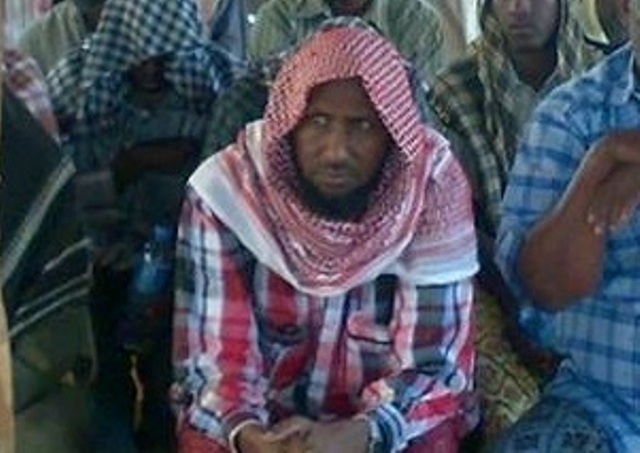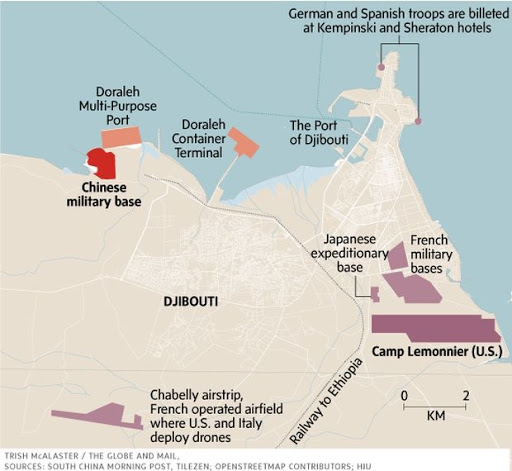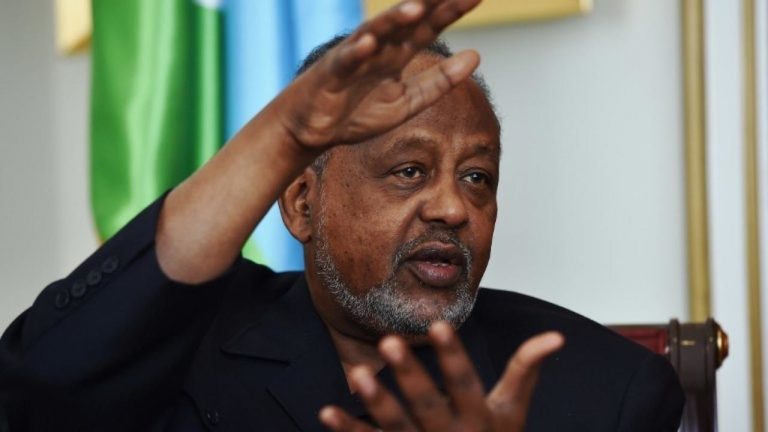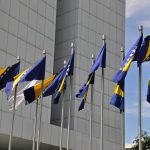Al-Shabaab tries to expand its influence in East Africa and push out Western foreign military forces beyond the region. It uses upcoming presidential elections uncertainty in Djibouti to grow influence and capabilities near the important world trade-route.
Ahmed Omar Abu Ubaidah (Abu Ubaydah Ahmad Umar), the leader of the Somalia-based al-Qaeda affiliate al-Shabaab called for attacks against American and French interests in Djibouti before key presidential elections on April 9, 2021. The Al-Shabaab leader accuses the Djibouti government of “turning the country into a military base from where every war against the Muslims in East Africa is planned”. In newly released audio, Ahmed Omar Abu Ubaidah accuses the leaders of Djibouti of turning the country into a military base “from where every war against the Muslims in East Africa is planned.” Abu Ubaidah specifically called on the youth in Djibouti to “carry out individual lone wolf martyrdom operations” to expel the French and Americans.”

“Make American and French interests in Djibouti the highest priority of your targets,” the audio posted by al-Shabaab media says. Djibouti has a military contingent serving as part of the African Union’s peacekeeping mission in Somalia.
Abu Ubaidah said his group was ready to offer “safe refuge” and “prepare and train” those willing to migrate from Djibouti if they cannot fulfill the “individual obligation of jihad.”
Al-Shabaab remains a persistent threat to U.S. interests in East Africa. This is why it remains important to apply continued pressure on the al-Shabaab network and isolate the threat it presents to the region and beyond.
However, Al-Shabaab’s announced tactic can be inspired by third forces and have the geopolitical meaning, as Umar didn’t mention Chinese forces and Chinese military base in Djibouti. This seems non-logical while fighting with foreign military presence and could point at pressure attempt on US foreign policy in the Horn of Africa.
Djibouti voters will go to the polls where incumbent Ismail Omar Guelleh is seeking a fifth term in office. President Ismail Omar Guelleh may think, that he can win the elections by further opposition suppression but will not meet a significant critic from the West as a security guarantee in the region. Meanwhile China will save and expand its presence in Djibouti.

Until today, Djibouti was a comparatively stable and secure nation in an otherwise volatile region and has thus attracted several military powers from around the world.
Djibouti is now home to the most extensive permanent US military base in Africa, Camp Lemonnier, which acts as the launchpad for fighter planes, helicopters and US Special Forces alike.
The coalition of five political parties is hoping to oust Ismaïl Omar Guelleh who has been president of the country since 1999. The possibility of anti-government events or protests exists.
The United States completed the withdrawal of most troops from neighboring Somalia in January following an order from then-President Donald Trump.The number of U.S. military personnel in Somalia ranged from 650 to 800 people. U.S. troops supported and mentored an elite Somali unit known as the Danab “lightning” brigade.
Al-Shabaab previously attacked Djibouti on May 24, 2014 in a double suicide explosion at a restaurant frequented by Westerners, killing three people. Since that there was no evidence of Al-Shabaab activity in this country. It’s impossible to deny that Al-Shabaab threats may be used as a reason to introduce security measures to affect elections result.
The United States Africa Command (AFRICOM), which has a base in Djibouti, says it is aware of the recent threats. The U.S. military has also been conducting airstrikes against Al-Shabaab but there have been no confirmed strikes since U.S. President Joe Biden took office. Earlier this month, Somali military officials expressed concern at the reduction of airstrikes, which they fear could give the militant group additional momentum.
Djibouti has seen a deep crisis played out since the legislative elections of 22 February 2013. The results of these elections, in which the opposition party took part for the first time in a decade, were largely disputed by the opposition’s activists and supporters.
The authorities have denied recognition to opposition parties including the Movement for Democratic Renewal and Development (MRD), the Rally for Democratic Action and Ecological Development (RADDE), and the Movement for Development and Liberty (MoDEL), whose members have been periodically harassed, arrested, and prosecuted. The law requires the leaders of political parties to have clean criminal records, and the government has pursued spurious charges against opposition figures to disqualify them or their parties.
The ruling party dominates the state apparatus and uses security forces and other administrative resources to marginalize, disrupt, and suppress independent political activity.
In April 2014, Mr Guelleh had declared that he would not be putting himself forward in 2016. However, next December he announced that he would be a candidate in the 2016 presidential election. This reversal of his decision, coupled with the policy of suppressing any form of opposition mobilised against the Djibouti authorities, has further fuelled the climate of violence already prevailing in the country.
The president, who holds most executive power in Djibouti, serves five-year terms under current rules. President Guelleh was elected to a fourth term in 2016, having been credited with 87 percent of the vote. The opposition fractured, with some groups boycotting the poll and others participating. The lead-up to the election featured restrictions on the media and the harassment or detention of opposition figures.
Guellah was re-elected in 2005 with 100% of the vote, after going unchallenged by the opposition. This alliance of Guellah- supporters was joined by the National Democratic Party and the Social Democratic People’s Party in 2003 parliamentary elections, in which the coalition maintained its hold over all 65 legislative seats. Supporters of President Guellah & Issa People — The RPP (ethnic-Issa) systematically co-opted the leadership of FRUD (ethnic-Afar) beginning with the peace agreement in 1994.
Incumbent President Ismail Omar Guelleh will be seeking a fifth term in office in his race against businessman Zakaria Ismael Farah of the Movement for the Development and Balance of the Djiboutian Nation (MDEND). Guelleh and his ruling Union for a Presidential Majority (UMP) have been in power since Djibouti’s first multiparty elections in 1999. All other major opposition parties, including the Union for National Salvation (USN) and the Rally for Action, Democracy, and Ecological Development (RADDE), are boycotting the 2021 election, citing alleged bias by the National Independent Electoral Commission (CENI).
According to opposition, elections are no longer useful in Djibouti. And so the longer the power goes on, the more the risks of chaos and instability will be present. The reason the opposition has organized the transitional charter is to prevent chaos. From the fall of power, this charter must be applied. And as Guelleh will not start on his own, the opposition is building a balance of power through multifaceted struggles to release it.
Guelleh has proven particularly beholden to Beijing’s interests, banking on Chinese investments to such a degree that Djibouti is not only dependent on Beijing but highly indebted to it as well: in recent years, the country’s debt to China has reportedly ballooned to 70 percent of its gross domestic product (GDP).
According to the opposition, Guelleh’s efforts to turn the country into a commercial hub for Africa have, ultimately, led to him selling out Djibouti’s interests to Beijing.
Given that almost 80 percent of the country’s population live in poverty, the question arises what is being done with these millions from China, apart from enriching the political elites.
Mohamed Kadamy, the boss of the rebel group FRUD (Front pour la restauration de l’unité et de la démocratie ) joined the opposition initiative against President Guelleh. FRUD was a side in The Djiboutian Civil War (Afar Insurgency). During the war, Djibouti accused Eritrea of assisting the rebels and of spreading terrorism in the region. FRUD, Afar rebel movement in the north of the country, advocates armed struggle and its impact could grow if President Ismaïl Omar Guelleh (IOG) continues to close the door to democratic reform and systematically represses the civil opposition of the Union pour le salut national (USN). They back the Afars in Djibouti, Eritrea and Ethiopia, as well as work on the Afar elders and particularly their links with the Sultan of Rahaita, Abdoulkader Daoud, who is banned from entering Djibouti.
President Guelleh is the flag-bearer of the ruling coalition, the Union for a Presidential Majority. His coalition is fraught with tribalism and bickering. The candidate for the main opposition USN coalition is Omar Elmi Kaireh, a Djibouti independence hero. Mohamed Daoud Chehem is representing the Djiboutian Party for Development, a splinter group of the USN. There are three independent candidates: Djama Abdourhaman Djama, Mohamed Moussa Ali alias Tourtour, and Hassan Idriss Ahmed, a former diplomat, have also announced that they are standing for election.




